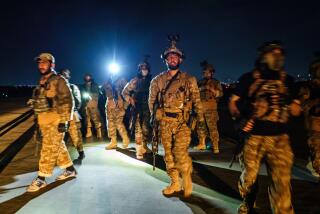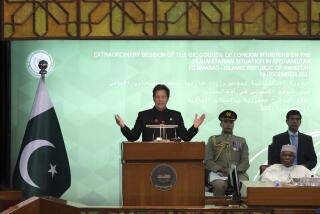U.S. Opposes Any Deal With Taliban Forces
- Share via
TALOQAN, Afghanistan — Northern Alliance forces on Monday threatened to attack thousands of surrounded Taliban fighters in the northern Afghan city of Kunduz if they don’t surrender, and U.S. Defense Secretary Donald H. Rumsfeld warned that freeing the hard-line fighters would endanger America.
Rumsfeld said he would do everything he could to prevent a negotiated deal in the stalemate because a large share of the Taliban force is made up of zealous non-Afghan fighters from the Al Qaeda terrorist network. Freeing them, he said, would pose a risk of terrorist attack.
“My hope is that they will either be killed or taken prisoner,” he said at a Pentagon briefing. “They’re people who have done terrible things.”
He also said the United States would oppose any deal that would permit Mullah Mohammed Omar, the Taliban’s supreme leader, to escape from the southern city of Kandahar, the Taliban’s other remaining stronghold. On Friday, Omar was reported to be negotiating to turn over power to two leaders of local Pushtun tribes so that he could flee into the mountains.
Rumsfeld’s comments came as U.S. forces combed southern Afghanistan for Osama bin Laden and Taliban leaders, and U.S. warplanes continued to hit front-line targets near Kunduz and Kandahar.
Wars in Afghanistan have frequently been resolved by deals in which members of one side defect or simply put down their weapons. Hundreds of Taliban fighters have already given up arms in such arrangements since this war began.
But the opposing forces in Kunduz and Kandahar have not been able to reach such an agreement because the Taliban forces there include foreigners allied with Bin Laden’s Al Qaeda network. The foreigners, who are from Arab countries, Pakistan or Chechnya, have in many cases been trained in Bin Laden’s terrorist camps and tend to be more committed than their Afghan peers in the Taliban.
These foreign soldiers, estimated to number between 10,000 and 30,000, fear that they will be slaughtered if they surrender.
As a result, the two sides remain far apart, though United Nations representatives have recently joined discussions to end the week-old stalemate.
A Northern Alliance spokesman told reporters that a one-day extension, granted Monday, of a deadline to surrender would give local Taliban officials more time to persuade the non-Afghan troops to give up their arms. “If they don’t accept, then we will have to fight with them,” said Zubair, who like many Afghans goes by only one name. There were reports early today that the alliance was extending the deadline by several days.
Anti-Taliban forces have continued to stream into the area around Kunduz, which is populated mainly by the Pushtun tribesmen who also make up the majority of the Taliban. Although most of the Taliban fighters and local civilians are from the same ethnic group, the fighters have been terrorizing the large number of civilians who remain in the area, refugees say.
Over the weekend, there were increasing reports of foreign fighters in Kunduz assassinating Afghan Taliban troops who wanted to surrender.
Zubair, the Northern Alliance spokesman, said he could confirm that the foreign Taliban troops in Kunduz killed an estimated 200 of their local allies on Sunday after the locals decided to surrender. An additional 300 fighters succeeded in defecting, he said.
Rumsfeld acknowledged that he had seen reports from Afghanistan of troops shot through the head in such killings, though he said he could not confirm that they were true.
In Kabul, the Afghan capital, U.N. negotiator Francesc Vendrell met with Afghan leaders and sought to organize talks about installing an interim government, a U.N. spokesman said.
The meeting is expected to be held in Bonn, Germany, this weekend, officials said.
U.S. forces stepped up their effort to enlist Afghans in the search for the Taliban and Al Qaeda leadership with a new round of radio broadcasts. The Pentagon believes that intelligence from average Afghans who have come across Bin Laden may be the key to finding him and breaking his terror network.
The broadcasts announced that a $25-million reward would be paid “for information leading to the location or capture” of Bin Laden or eight other top associates.
“Every day more foreign terrorists are defeated in battle,” say the broadcasts, which were carried by the Commando Solo military aircraft. “Because some of these cowards and murderers have gone into hiding, we ask for your help.”
The U.S. forces also began dropping leaflets with a similar message near Kunduz and Kandahar and near Shindand, in western Afghanistan.
Rumsfeld said the U.S. Special Forces detachment in Afghanistan, which consists of several hundred troops, is now as large as he wants it to be and will not be expanded.
In his comments, Rumsfeld sought to dispel any notion that the U.S. forces were close to grabbing Bin Laden. The idea “that we have them contained in any small area, I think, would be a misunderstanding of the difficulty of the task,” he said.
President Bush, in comments at the end of a Cabinet meeting, sounded more positive.
“We’re hunting him down. He runs and he hides,” the president said. But, he added, “the noose is beginning to narrow. The net is getting tighter.
“This is a difficult assignment,” Bush said. “Things happened very quickly in Afghanistan recently. It went to show that our strategy was a well-thought-out strategy.
“I told the American people right from the get-go of this effort, it may take a month, it may take a year. However long it takes, we’ll succeed,” he said.
Bush said he could provide no evidence that searchers were closing in on Bin Laden without compromising military operations, “except I can point to the map of Afghanistan where more and more territory are now in friendly hands.”
Later, Bush welcomed the ambassadors of about 50 predominantly Muslim nations to the White House for the traditional meal, known as iftar, that breaks the sunup-to-sundown fast during the Muslim holy month of Ramadan.
In London, a newspaper reported that the United States and Britain were at odds over deployment of British troops into Afghanistan.
The Evening Standard said Prime Minister Tony Blair was eager to commit a large number of troops to take control of the situation on the ground, while Washington was unwilling to do more than deploy Special Forces to hunt down Bin Laden and the Taliban leadership.
Britain has an advance force of 100 Royal Marines at Bagram air base outside Kabul. About 6,000 troops from the Second Battalion of the Parachute Regiment and Royal Marines remain on short notice to go to the region, and some of them had been expected to move over the weekend, but they didn’t.
Spokesmen for the Ministry of Defense and Downing Street denied any rift and said the situation was simply developing more slowly on the ground than had been anticipated. The airport is not fully secured, they said, and there is not yet agreement with the Northern Alliance as to what the British troops would do.
*
Reynolds reported from Taloqan and Richter from Washington. Staff writer Marjorie Miller in London contributed to this report.
More to Read
Sign up for Essential California
The most important California stories and recommendations in your inbox every morning.
You may occasionally receive promotional content from the Los Angeles Times.














